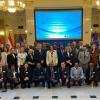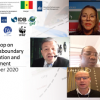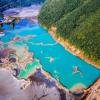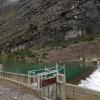News
Displaying Results 76 - 100 of 222
Transboundary water cooperation has the potential to generate a broad range of economic, social and environmental benefits through improved water management. This is widely recognized and most of these benefits can be assessed. But how to assess spill-over benefits from enhanced trust and…
In the pan-European region, citizens are feeling the impacts of climate change through extreme weather events. This undermines equitable access to water and sanitation as human rights, due to increasing water scarcity and increased burden of water diseases due to overflow of untreated sewerage…
Experts from Hungary, Ukraine, Serbia, Romania, Slovakia, Croatia, Czechia and Austria joined UNECE in Hungary to take part this week in a practical exercise in the operational area of the Danube Oil Refinery related to industrial accident and water pollution management. This one day exercise…
Accidental water pollution, which can be sudden and heavy as a result of industrial accidents, endangers people and the environment where chemical activities take place near a river, lake or water body. Accidental water pollution events can be triggered by natural hazards, such as floods, lightning…
Transboundary rivers, lakes, and aquifers play a vital role in supporting the livelihoods of billions of people worldwide. Roughly 60% of global freshwater flow is in shared basins. About 40% of the world’s population lives in shared basins. The development and management of transboundary water…
Joint efforts to harmonize data collection, strengthen monitoring and data exchange on water quality, develop early warning systems on water pollution at transboundary waters and improve collection and sharing of data on transboundary aquifers are needed for effective regional cooperation in…
West Africa is rich in transboundary waters with 25 transboundary river basins. The Comoé, Bia and Tanoé river basins are among the main basins that have so far not had a joint management mechanism. The combination of higher water demand from population growth as well as the projected new water…
“There is a not a single major global challenge that does not involve water. This includes migration, conflict, disease, hunger, gender equity, population growth, urbanization, and climate change”. These were the words of UN-Water Chair, Mr. Gilbert Houngbo, as governments and key stakeholders from…
Transboundary waters cover nearly half of the earth’s land surface and account for 60 per cent of global freshwater. Forty percent of the world`s population lives in shared basins, providing them with drinking and domestic water, irrigation for agriculture, enabling industries to function,…
Hydrology and environment specialists from Afghanistan and Tajikistan are conducting a hands-on study this week to identify and discuss issues related to the efficient use of water resources, land use, irrigation practices and biodiversity in the upper Amudarya basin. Particular attention will…
Achieving the Sustainable Development Goals (SDGs) will require coordination across sectors, coherent policies, and integrated planning. It is increasingly clear that authorities need to “break the silos” of their sectoral mandates and work in better coordination across different sectors. The…
Integrated management of water, energy and land resources, while protecting ecosystems, remains a substantial challenge in the Western Balkans. The Water-Food-Energy-Ecosystems (WEFE) Nexus approach offers solutions that can reconcile potentially conflicting interests as they compete for the same…
Mining is an important sector and economic contributor in Central Asian countries due to their rich mineral base. However, the mining activities also generate huge amount of waste which can contain hazardous substances and must be safely stored in so-called tailings management facilities (TMFs).…
The COVID-19 pandemic has highlighted access to water and sanitation as the first line of defence, enabling people to frequently wash their hands in line with good hygiene practices. Governments must take all efforts to ensure equitable access, especially for vulnerable groups (people living in…
While transboundary rivers, lakes and aquifers, accounting for 60 per cent of global freshwater flows, are of crucial importance for the sustainable development and political stability of riparian States, the financial means for their management, development and protection are insufficient in most…
A decade of efforts by UNECE and the Organization for Economic Cooperation and Development (OECD) to support countries of Eastern Europe, the Caucasus and Central Asia to modernize the management of their water resources have paid off. Successes include the adoption of a water sector reform…
Prevention of and preparedness for industrial accidents require special attention in Tajikistan, a country with a strong mining industry. The mountainous terrain of mining sites makes them highly susceptible to earthquakes, mudflows and floods, which can provoke Natech events (natural hazards…
Industrial safety and the prevention of accidental water pollution were high on Kazakhstan’s agenda this week, with the Second Meeting of the Inter-institutional Working Group on Tailings Safety and the Prevention of Accidental Water Pollution (IIWG).
The meeting brought together more than 60…
Uzbekistan is one of the world's largest producers of gold and uranium. In the last 40 years, Uzbekistan has built a strong mining industry, which is expected to grow in the years to come, given that only 20 % of the country’s territory has yet been explored. The expected rise in the number and…
Experts from Albania and Montenegro met in Shkoder (Albania) on 25 April 2023 to progress with the exchange of information on the shared Cijevna/Cem River. This was the second meeting of the joint technical group on monitoring and assessment established upon recommendation of the Implementation…
With its strong mining industry, mountainous areas and high seismic hazards, prevention and preparedness for disasters and climate change adaptation are high on Tajikistan’s agenda. In particular, the increasing frequency and severity of weather events due to climate change can undermine the safety…
Preventing accidental water pollution remains a key challenge for many countries within and beyond the UNECE region. Approximately 60% of the world’s freshwater flows occur in transboundary river basins where 40% of the world’s population live. Countries rely increasingly on transboundary water…
UNECE and the European Union continue to support pilot applications of the Strategic Environmental Assessments (SEA) in Belarus and Georgia in the framework of the European Union Water Initiative Plus programme for the Eastern Partnership Countries (EUWI+). SEA is an essential planning tool for…
The Water Convention has facilitated the First round of Technical & Planning Negotiations of the Draft ‘Agreement on the Establishment of the Luapula River and Lake Mweru Authority between the Democratic Republic of Congo (DRC) and Zambia on 18 and 19 April, concerning the transboundary Lake…
Strong cooperation between the World Bank and UNECE, which services the Convention on the Protection and Use of Transboundary Watercourses and international Lakes (Water Convention), can bring many benefits: the Convention can increase the sustainability of regional and basin cooperation…
















